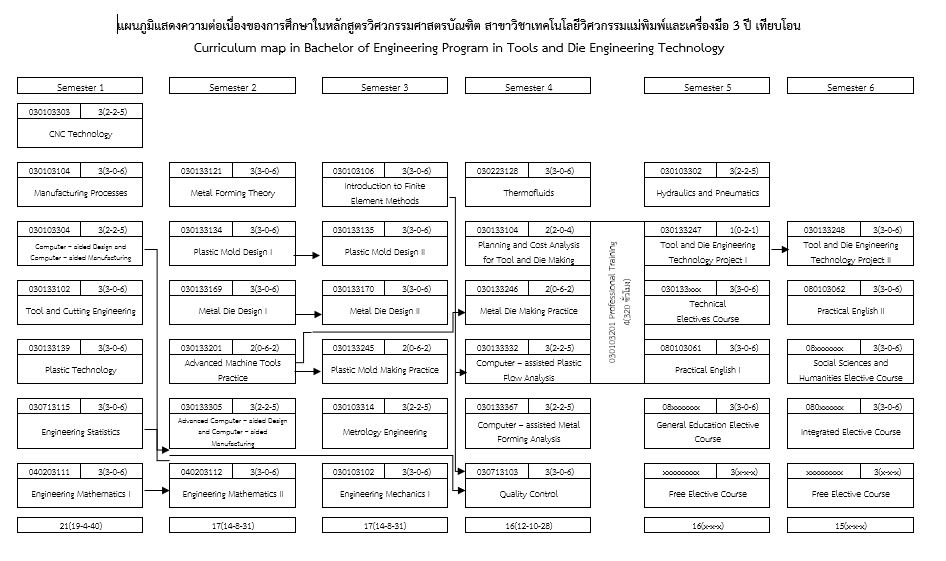Tools and Dies Engineering Technology
The mold industry is an upstream industry. However, the amount of knowledgeable personnel and domestic talent is still lacking. This course was created to produce graduates with expertise in designing and making molds for sending into the mold manufacturing industry, manufacturing of parts and related products.
Program 3 years Credits 106 Credits
ELO 2 (S) Be able to identify the relationship of the problem, document search and solve complex problems in tools and die engineering technology. To preliminary summary using principles and tools to analyze mathematics, science and engineering accurately.
ELO 3 (S) Be able to find answers to complex problems in tools and die engineering technology and design processes related to the engineering technology of tools and die. according to the need and requirements of the job taking into account society, safety, health and environmental requirements or professional practice standards
ELO 4 (S) Be able to examine, diagnose and evaluate complex problems of engineering technology of tools and die by making assumptions, design of experiments, analysis, interpretation, data, and synthesis of data to obtain rationally correct conclusions.
ELO 5 (S) Be able to suitable select and apply appropriate and up-to-date techniques, methods, resources, equipment, tools and die engineering technology information, taking into account the requirements and limitations of such tools and equipment. according to the correct principle.
ELO 6 (G) Be able to work with people from various disciplines, and possess leadership with efficiency.
ELO 7 (G) Be able to communicate in engineering, have engineering drawing skills, and Issuing commands and receive work orders clearly and effectively.
ELO 8 (G) Be able demonstrate responsibility for the practice of the engineering profession. in the context of society, the environment, and sustainable development.
ELO 9 (G) Be able to understand and adherence ethics, and engineering ethics based on academic.
ELO 10 (G) Be able to apply knowledge of economics and management in the production process of tools and die technology considering the risks and situations of tools and die industry in the country and the world economy.
ELO 11 (G) Realize the necessity of applying knowledge for self-development in lifelong learning, developing one’s quality of life and live with potential.

students must be a graduate of a High Vocational Certificate in the field of Die, Plastic mold, Machine Tool, and Machine Drawing or equivalency.
| Total Credits | 106 | Credits | ||||
| 1) General Education Subjects | 15 | Credits | ||||
| a. Languages Subjects | 6 | Credits | ||||
| b. Integration Subjects | 3 | Credits | ||||
| c. Social and Humanity Subjects | 6 | Credits | ||||
| 2) Specialization Subjects | 85 | Credits | ||||
| 1. Core Subjects | 21 | Credits | ||||
| – Mathematics and Science Fundamentals Subjects | 6 | Credits | ||||
| – Engineering Fundamentals Subjects | 15 | Credits | ||||
| 2. Professional Subjects
– Compulsory Subjects – Technical Elective subjects |
64
23 35 |
Credits Credits
Credits |
||||
| – compulsory subject | 32 | Credits | ||||
| – Elective subject | 3 | Credits | ||||
| – Engineering Fundamentals Subjects | 2 | Credits | ||||
| – Professional Training * | 4 | Credits | ||||
| 3) Fee Elective Subjects | 6 | Credits
|
||||
Semester 1: June – September
Semester 2: November – February
Summer semester: April – May
Potential Careers after Graduation:
- Production engineer and maintenance tools and die.
- Plastic and metal parts and product design engineer.
- Quality Control and process engineer of tools and die.
- Research and development engineer.
- Production engineering of plastics and metal part.
- Entrepreneur/Business owner in tools and die.
- Government agencies and private companies related to tools and die.
- Educational personnel.
Contact Details:
Division of Tools and Die Engineering Technology
1st Floor Building 62 College of Industrial Technology
King Mongkut’s University of Technology North Bangkok
1518 Pracharat 1 Rd., Wongsawang Sub-District, Bangsue District, Bangkok 10800
![]() +66 2 555-2000 ext. 6428
+66 2 555-2000 ext. 6428
![]() Asst. Prof. Piboon Sinpayakun (pibbon.s@cit.kmutnb.ac.th)
Asst. Prof. Piboon Sinpayakun (pibbon.s@cit.kmutnb.ac.th)
Mr. Narongsak Nithipratheep (narongsak.n@cit.kmutnb.ac.th)
Asst. Prof. Dr. Uten Khanawapee (uten.k@cit.kmutnb.ac.th)
Dr. Sorasak Wongmanee (sorasak.w@cit.kmutnb.ac.th)
Asst. Prof. Manat Hearunyakij (manat.h@cit.kmutnb.ac.th)
Asst. Prof. Vatchara Layluk (vatchara.l@cit.kmutnb.ac.th)
Dr. Sakchai Muangpasee (sakchai.m@cit.kmutnb.ac.th)
Asst. Prof. Dr. Arkarapon Sontamino (arkarapon.s@cit.kmutnb.ac.th)
Dr. Chiwapon Nitnara (chiwapon.n@cit.kmutnb.ac.th)
Mr. Kumpon Tragangoon (kumpon.t@cit.kmutnb.ac.th)
Mr. Tawatchai Maidung (tawatchai.m@cit.kmutnb.ac.th)

